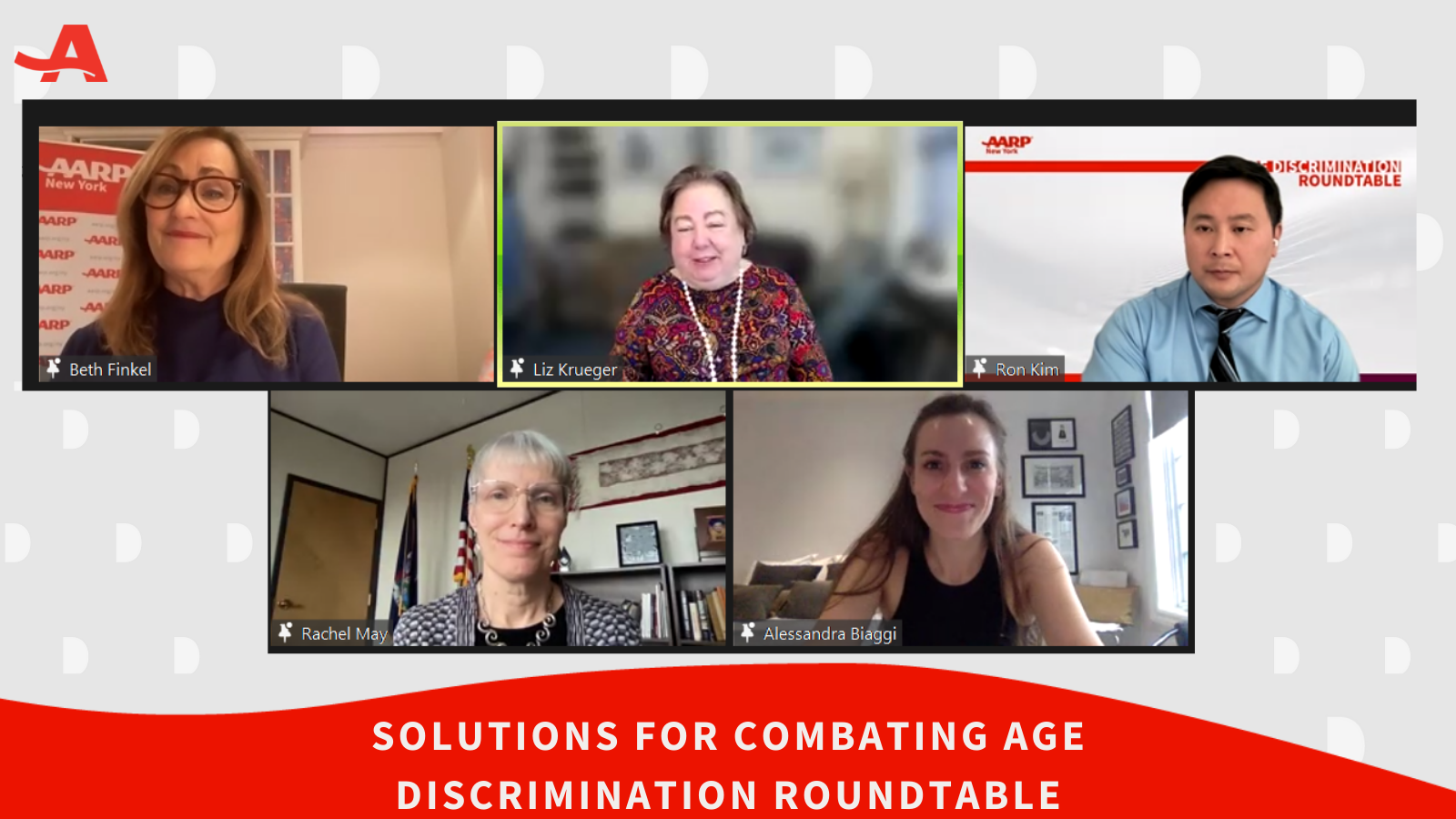AARP Hearing Center

New York, NY—During a lively virtual roundtable discussion this week, key lawmakers and advocates for older New Yorkers called for a societal shift in how aging is perceived in the workforce and highlighted legislation that would combat age discrimination.
“AARP New York is fighting to ensure all workers are treated fairly based on their qualifications, not their age,” said Beth Finkel, AARP New York State Director. “We look forward to continue working with the legislators who generously gave their time to this important topic and continue fighting for key legislation that will help eliminate ageism once and for all.”
The roundtable on age discrimination was the third and final event in a series focusing on age discrimination and ageism centering around AARP research. A national survey said 78% of workers 50 and over report they’ve seen or experienced age discrimination in the workplace. And 96% of older workers polled agree that laws to combat age discrimination should be stronger.
The forums joined by hundreds of professionals will help inform and shape advocacy, legislation, and a state AARP policy blueprint in the coming months. During this week’s roundtable, a poll of attendees found that 83% of participants have experienced age discrimination or know of someone who has.
“As a society in this country, there is so much more we can do to cherish our aging population. We must look to aging New Yorkers for their wisdom, and to show us the way towards a future that uplifts all of us,” Senator Alessandra Biaggi said.
"I think the way that we can embrace the future of work is by also making sure no one is left behind,” said Senator Biaggi, who is sponsoring a bill (S7292) that would clarify the standard for proving age discrimination.
Moderator Reggie Nance, AARP New York Associate State Director, said one solution is a bill Connecticut recently passed that prohibits employers from asking for graduation and birthdates on job applications.
Senator Liz Krueger and Assemblyman Ron Kim are sponsoring similar legislation (S1480, A7550) in New York, which would also ban age-related inquiries to ensure that the hiring process is not tainted by age bias.
“People need to work for lots of different reasons,” Senator Krueger said. “They need to work because they need to pay the bills. They need to work because it gives them a stronger sense of self. They need to work because it actually gives them a continuation of what they've thought of as their reason to be for so many years of their life. … And guess what? We're getting older, more and more of us are getting older.”
She has heard firsthand from callers to her office of people who faced serious challenges getting job interviews. If you submit your application online with your birth date or graduation dates, an employer can simply omit considering applications of individuals over a certain age.
“There was a time many decades ago when we institutionally and systemically tackled racism and sexism, but we somehow left ageism out,” Assemblyman Kim said. “And you know, we're trying to play catch up here and trying to police these matters in a very strategic matter. But we shouldn't be in a position to play catch up at all. We need to be thoughtful in how we understand ageism intersects with racism and sexism.”
“At this moment, when we are desperate for people to do jobs, there is a shortage of workers in so many fields,” said Senator Rachel May, who is also a co-sponsor of S1480. “If older New Yorkers are somehow getting the message, however subliminally, that they are not going to be qualified or won't be deemed acceptable for jobs, that's shooting ourselves in the foot.”
Greg Olsen, Acting Director, New York State Office for the Aging, said that according to the Bureau of Labor Statistics data, 48% of individuals 55 and older are working, and that’s expected to continue to grow as people stay in the workforce longer and live longer. But age discrimination can harm those workers. “There's a negative impact on physical health, a negative impact on mental health and emotional trauma,” Olsen said. “It's linked with earlier death, and there's a negative impact on economic and financial security of individuals who lose a job or are passed over for promotions.”
Cathy Ventrell-Monsees, age discrimination expert and co-author of “Age Discrimination Litigation,” noted that the dramatic change due to the pandemic has caused a huge upheaval in the workplace, “the great resignation and the great retirement.”
There were also massive layoffs in 2020, but now employers are in a labor shortage crisis, she noted. “And the question is, will employers treat older workers fairly and equally as they fill those jobs? Will they seek them out? Unfortunately, I would say if past economic and hiring trends are an indicator, the answer is likely not,” Ventrell-Monsees said.
Follow AARP New York on Twitter: @AARPNY and Facebook: AARP New York
About AARP
AARP is the nation’s largest nonprofit, nonpartisan organization dedicated to empowering people 50 and older to choose how they live as they age. With a nationwide presence and nearly 38 million members, AARP strengthens communities and advocates for what matters most to families: health security, financial stability and personal fulfillment. AARP also produces the nation's largest circulation publications: AARP The Magazine and AARP Bulletin. To learn more, visit www.aarp.org/ny and follow @AARPNY on social media.
#































































